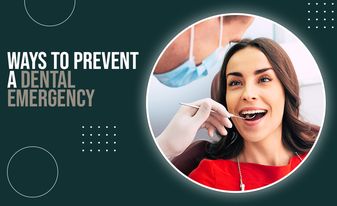Most people do not prioritise their dental health until they have a dental issue that requires immediate care. However, except you take proper care of your dental health, you will likely have a dental emergency at some point in your life.
Dental emergencies usually cause extreme pain and maybe frightening. Anyone who has experienced severe tooth pain or had a dental emergency in the past can attest to this. Taking different steps can help you prevent dental emergencies.
One of these steps is being informed about your oral health. When you are aware of symptoms associated with dental issues and the right time to see emergency dentist London, you can cope with different dental situations.
Regular dental care and a busy schedule
In most cases, seeking regular preventive oral care can prevent dental emergencies. However, tight schedules and hectic life can stop people from seeking routine dental care. Most people find it difficult to create time in their schedule to visit their dentist regularly, especially mothers taking care of young families.
When dental emergencies arise, they make matters worse, throw everyone out of track, create chaos and cause stress.
Focusing on your general wellbeing
Adults, especially busy moms, tend to focus on the health and wellbeing of other family members, putting theirs in the back seat. If this is the case with you, think about the chaos and cost of dealing with a dental emergency.
Dental emergencies are more expensive than preventive dental care, and the treatments for emergencies usually take more time. They may also be more difficult to treat, making balancing your daily routine more difficult.
For example, when you develop a toothache, instead of searching for different home remedies and trying them out without success, you can visit the dentist for faster and more effective treatment at the onset of the toothache.
Most dental emergencies are preventable, especially when you know their symptoms and how to maintain your oral health.
Preventing dental emergencies
The following can help you prevent dental emergencies
Changes in your mouth tissues, gums or teeth, or persistent tooth pain
In some cases, a persistent toothache may signify a cavity or damaged cavity. Tooth pain usually means a serious problem, and when it stops after a while, it may be tempting to overlook it. However, try not to ignore tooth pain because if the root cause of the pain is severe tooth infection, it can damage the nerves. It is unlikely for an infection to heal without professional dental care, so the sooner you get treatment, the better your chances of saving the tooth.
Ensure you inform your dentist if you observe changes in your oral tissues such as your lips and cheeks, tongue, floor, and roof of your mouth or gums. Mouth ulcers, sores or injuries that do not heal properly need professional dental care.
Maintain a good home oral care routine
Brushing your teeth at least twice (in the morning and before going to bed) every day is important. While brushing, ensure each session lasts for a minimum of two minutes. This gives you sufficient time to brush all your tooth surfaces.
You can opt for an electric toothbrush as it has a built-in timer to track how long your brush is. If you have a manual toothbrush, you can time your brushing time with your smartphone or a small timer.
Replace your toothbrush often
It is advisable to change your toothbrush often, after 2 – 3 months before it becomes frayed or worn out. The heads of electric toothbrushes usually have built-in indicators that show when the toothbrush is due for changing.
A worn-out toothbrush cannot clean your teeth properly, and getting a new one wouldn’t cost much.
Interdental cleaning
Although using dental floss is the traditional and easy way to clean between the teeth, you can also use other teeth cleaning methods such as soft picks, Waterpik or interdental brushes. If you don’t floss regularly, one-third of your tooth surface will remain unclean, increasing the risk of gum disease and tooth decay.
Your dentist can easily tell if you floss regularly or not because between your teeth will remain dirty without an interdental cleaning.
Reduce daily sugar intake
It is advisable to reduce your daily sugar intake and be mindful of when you have sugary treats. Frequent intake of sugary foods and drinks increases the level of acidity in your mouth.
When you take sugar, the bacteria in the mouth feed on them for sugar, producing a weak acid that attacks the teeth enamel and weakens them by removing essential minerals. Over time, acid attacks on the teeth cause more damage to the enamel, resulting in cavities in the long run.
It takes about 30 minutes to an hour after eating sugary food for the pH level in the mouth to normalise. Instead of taking sugary foods alone, include them in your main meal as this helps reduce the time your mouth remains acidic and reduce the damage the sugary foods can cause.
Have a family dentist
Ensure you have a family dentist and all your family members are registered with the dentist. Also, attend all your routine appointments for cleanings and check-ups. Getting a dentist close to your workplace or home is advisable, so you can easily fit the dental appointments into your schedule and meet up with them.
While searching for a dentist, consider if the office is easily accessible by public transport or has parking space. When visiting your dentist is easy, it makes attending all your appointments less challenging.
Wear a mouthguard while playing sports
Ensure you and your children wear a protective mouthguard while engaging in any sports. Most dental injuries result from some non-contact and contact sports. If you are at risk of receiving a blow to your mouth, ensure you wear a mouthguard.
Dental injuries while playing sports can crack or chip the teeth, and in some cases, knock out the teeth. Carrying out restorative dental work for these injuries cost a lot and may need a touch up throughout a lifetime.
With a custom-made sports mouth guard, you can have full protection for your teeth and reduce your risk of having dental injuries. The custom-made mouthguard doesn’t obstruct breathing and is comfortable to wear.
Address your dental anxieties and phobias
Most people have a phobia and feel anxious whenever they visit the dentist. Dentists understand this and are usually sympathetic, helping patients overcome this problem.
If you have dental phobia or anxiety, ensure you opt for a dental clinic that provides care to help nervous patients relax and discover the cause of the phobia. The dentist will provide dental treatments at your pace, and you can consider meditation or relaxation techniques before the appointment.
Bring your children for your dental appointments
Dental care should start early because it helps the child feel more comfortable seeing the dentist, reducing the chances of developing phobias. Ongoing dental care for a child can prevent tooth decay, and the dentist can recommend ways to protect their teeth. This may include fluoride varnish to strengthen and harden the enamel.
Dental sealants can protect the chewing surface of the adult back teeth, which are more likely to get decayed. These dental sealants are more effective when applied as the teeth come in.
Visit the dentist if you crack or chip your tooth
When you do not repair your damaged tooth, bacteria enter the tooth, leading to decay and infection. Over time, a damaged tooth will require more extensive work, such as root canal therapy or tooth removal.
Repairing a chipped tooth with a London emergency dentist cost less and takes a shorter time, and you get to avoid unnecessary pain. This also applies if you replace a loose or missing filling immediately.
Stay hydrated
Many people do not drink much water, which means limited saliva production to maintain oral health. Saliva serves as a protective layer that helps in maintaining a neutral pH in the mouth. It also washes away old skin cells, bacteria, and excess food particles. Saliva also contains minerals that reduce the risk of tooth decay and protect the teeth.
If you need an emergency dentist for any dental emergency, visit Chatfield Dental Clinic for composite bonding now in London. You can also call us now to schedule an appointment if you have any dental issues.

